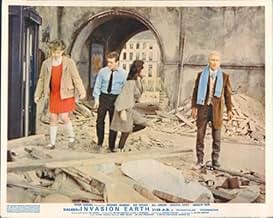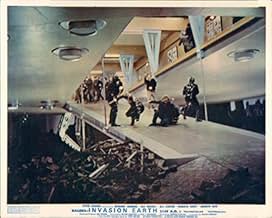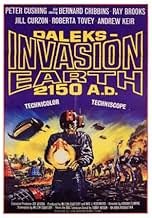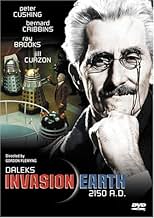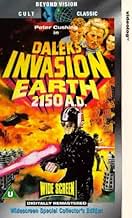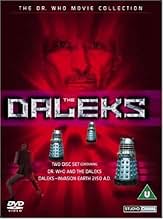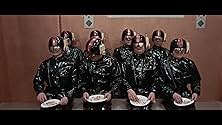Les Daleks envahissent la Terre
Titre original : Daleks' Invasion Earth 2150 A.D.
- 1966
- Tous publics
- 1h 24min
NOTE IMDb
5,9/10
4,8 k
MA NOTE
Le Dr Who et ses compagnons arrivent sur Terre en l'an 2150 après JC, pour découvrir que la planète a été envahie et sa population réduite en esclavage par les redoutables Daleks.Le Dr Who et ses compagnons arrivent sur Terre en l'an 2150 après JC, pour découvrir que la planète a été envahie et sa population réduite en esclavage par les redoutables Daleks.Le Dr Who et ses compagnons arrivent sur Terre en l'an 2150 après JC, pour découvrir que la planète a été envahie et sa population réduite en esclavage par les redoutables Daleks.
- Réalisation
- Scénario
- Casting principal
Avis à la une
If I'd seen this film for the first time now, having seen most of the TV series that inspired it, I'm not sure I'd be fantastically keen on it. But I'd like to think that I'd still enjoy it for it's superficial scariness and complete indifference towards any aspect of a plot that might get in the way of the oh-so-colourful set-pieces.
I remember first seeing this film one Saturday morning, after all of the other childrens' programmes had finished and in retrospect, that's probably when it works best - the music's loud and harsh enough to wake you up, but the story's not too taxing if you're not completely with it yet.
Fantastic stuff, if you're prepared to leave your brain at home for 90 minutes.
I remember first seeing this film one Saturday morning, after all of the other childrens' programmes had finished and in retrospect, that's probably when it works best - the music's loud and harsh enough to wake you up, but the story's not too taxing if you're not completely with it yet.
Fantastic stuff, if you're prepared to leave your brain at home for 90 minutes.
Daleks-Invasion-Earth:2150 AD, is an enormous improval on the preceeding film. It is more exciting and enjoyable and there is an impending sense of fear throughout the movie wich was evident in the Television series around this time. Peter Cushing gets to grips with his role as The Doctor in this movie. Bernard Cribbins comes on board and is fantastic. Ray Brooks and Jill Curzon enhance the swinging sixties fell apparent in the previous film, and the action never gives up. The multi coloured Daleks are a more frightening sight in a future decaying London thatn on there own planet, and the set designs and designs of the vicious Robomen are again superb. This is a juvenile movie, but enjoyable at that. For a new Doctor Who movie, someone like Tim Burton or Steven Spielberg should remake this, and they would have an absolute goldmine on their hands.
The On Her Majesty's Secret Service of the Doctor Who world, the two Peter Cushing-Dalek films have seen occasional reappraisal that labels them as "coolly kitsch" or "lovably camp". In reality, of course, they're complete pants.
The Doctor Who TV series actually had a considerable integrity, despite being made on a budget of 50p and never managing to shake off the "Kid's Telly" tag. Here Cushing plays the Doctor of the title, his surname actually becoming "Who". The Tardis, his sophisticated space-time machine, is now "Tardis", a naff-looking thing with a Yale lock on the door. Around the time this was made a "Carry On" actor would do his only television work in the Doctor Who series Peter Butterworth as the Meddling Monk. For the film we got Bernard Cribbins as P.C. Tom Campbell, a similar character to the one that married the Doctor's granddaughter on TV. Though as the film Susan is only ten that would be inappropriate here.
Both films (the other Doctor Who and the Daleks, Cushing joined by Roy Castle) were based directly on actual TV stories, the novelty being they were in colour. By the time the second came around the novelty was over and it didn't do the business of the first, despite being someway the better film. Perhaps this is because the original serial The Dalek Invasion of Earth was an attempt to mount a film's epic scale on a TV budget. To this end it transfers better to the medium, and its setting (future Earth as opposed to the first film's alien planet Skaro) is more accessible to audiences.
The big failure is, of course, send-up. Some of the series' b-movie concepts (mutated nuclear war victims get robot-armoured shells and invade Earth to steal its core) are ludicrous, but played straight can be rewarding. The films make a mockery of the whole concept, showing a total lack of respect for their source material. My advice is: if you don't like 'em, don't make 'em. Bearing in mind the Daleks were hot merchandise properties at the time, this is a cynical cash-in on the nation's youth. There's even a shameless product placement for Sugar Puff Cereals.
All involved are capable of better. Peter Cushing, respected in adult horror films, here opts for a no-effort parody of TV Doctor William Hartnell's performance. There is no trace of depth or consideration for the part he has chosen. Full credit does go to Ray Brooks, Andrew Keir and Philip Madoc for at least trying to take it seriously. Madoc was rewarded with four seperate roles in the television series, most notably as mad scientist Solon (1976) and The War Lord (1969). On the plus side, direction in terms of camera angles is actually very, very good, but is offset by incidental music so loud and outdated that it works against the mood entirely. Think SF drama with Carry On music and you're almost there.
Bright and colourful, (including a funky red Dalek) the film certainly has visual appeal. But the Daleks' voices, their volume increased considerably, are extremely grating. They also lack their trademark warmth and charm, being little more than robots. Their weaponry was scheduled to be flame-throwers, but was disallowed due to the young audience. This is perhaps fortunate as their gas sprays aid the Nazi allegory. Best bit? The exploding shed.
Trite jazz, lame comic setpieces and binliner outfits, the film is on TV virtually every Bank Holiday in England. And you know the strangest part? As bad as it is, come next Bank Holiday I'll probably be tempted to see it again.
The Doctor Who TV series actually had a considerable integrity, despite being made on a budget of 50p and never managing to shake off the "Kid's Telly" tag. Here Cushing plays the Doctor of the title, his surname actually becoming "Who". The Tardis, his sophisticated space-time machine, is now "Tardis", a naff-looking thing with a Yale lock on the door. Around the time this was made a "Carry On" actor would do his only television work in the Doctor Who series Peter Butterworth as the Meddling Monk. For the film we got Bernard Cribbins as P.C. Tom Campbell, a similar character to the one that married the Doctor's granddaughter on TV. Though as the film Susan is only ten that would be inappropriate here.
Both films (the other Doctor Who and the Daleks, Cushing joined by Roy Castle) were based directly on actual TV stories, the novelty being they were in colour. By the time the second came around the novelty was over and it didn't do the business of the first, despite being someway the better film. Perhaps this is because the original serial The Dalek Invasion of Earth was an attempt to mount a film's epic scale on a TV budget. To this end it transfers better to the medium, and its setting (future Earth as opposed to the first film's alien planet Skaro) is more accessible to audiences.
The big failure is, of course, send-up. Some of the series' b-movie concepts (mutated nuclear war victims get robot-armoured shells and invade Earth to steal its core) are ludicrous, but played straight can be rewarding. The films make a mockery of the whole concept, showing a total lack of respect for their source material. My advice is: if you don't like 'em, don't make 'em. Bearing in mind the Daleks were hot merchandise properties at the time, this is a cynical cash-in on the nation's youth. There's even a shameless product placement for Sugar Puff Cereals.
All involved are capable of better. Peter Cushing, respected in adult horror films, here opts for a no-effort parody of TV Doctor William Hartnell's performance. There is no trace of depth or consideration for the part he has chosen. Full credit does go to Ray Brooks, Andrew Keir and Philip Madoc for at least trying to take it seriously. Madoc was rewarded with four seperate roles in the television series, most notably as mad scientist Solon (1976) and The War Lord (1969). On the plus side, direction in terms of camera angles is actually very, very good, but is offset by incidental music so loud and outdated that it works against the mood entirely. Think SF drama with Carry On music and you're almost there.
Bright and colourful, (including a funky red Dalek) the film certainly has visual appeal. But the Daleks' voices, their volume increased considerably, are extremely grating. They also lack their trademark warmth and charm, being little more than robots. Their weaponry was scheduled to be flame-throwers, but was disallowed due to the young audience. This is perhaps fortunate as their gas sprays aid the Nazi allegory. Best bit? The exploding shed.
Trite jazz, lame comic setpieces and binliner outfits, the film is on TV virtually every Bank Holiday in England. And you know the strangest part? As bad as it is, come next Bank Holiday I'll probably be tempted to see it again.
When I first saw this on TV as a kid, I was really taken with the fanciful far-out concepts of a conquered Earth. For a 12 year-old boy into sci-fi, this was and is the ultimate escapist fare. I had no knowledge of the British TV series at the time so my intro to Dr.Who was Peter Cushing (playing older than he is), the movie version of the old-time traditional Doctor. I probably saw this film before the previous one "Dr. Who and the Daleks" as I was puzzled by the Doctor's recognition of his old foes, the unforgettable Daleks. Yes, who can forget those frog-like voices, warped by metallics, usually screaming for the death of humans. The British cast is really keen, especially Cribbins as an out-of-place copper and Andrew Keir as a hobbled resistance fighter. They bring a curious reality to the fantastic setting.
The picture has a decidedly British flavor and, of course, is filmed in the British countryside. Though I didn't reason this out at the time when I was a kid, it had an obviously different taste to it; I was mostly familiar with U.S. low budget sci-fi pics of the '50s and '60s at the time. The scope of the picture seemed really huge back then: London in a destroyed state, humanity decimated. There was that really cool flying saucer, looking fully functional and detailed. And there were the creepy Robo-men, in their slick black bodysuits and far-out helmets, like some futuristic Nazis or space zombies. All of this stuff really just took me over and I couldn't wait for the next time the local TV channels would run it again (not very often, as it happened). Some years later, I realized the title, 2150 AD, sounded cool, but the invasion by the Daleks must have occurred only a few years before the events of this movie, and the dilapidated buildings all looked like they'd been wrecked in the sixties. Ah, no matter. Many years later, I got the DVD and the thrill, tho muted by the long passage of experience and adulthood, is still there. They really knew how to make 'em back then.
The picture has a decidedly British flavor and, of course, is filmed in the British countryside. Though I didn't reason this out at the time when I was a kid, it had an obviously different taste to it; I was mostly familiar with U.S. low budget sci-fi pics of the '50s and '60s at the time. The scope of the picture seemed really huge back then: London in a destroyed state, humanity decimated. There was that really cool flying saucer, looking fully functional and detailed. And there were the creepy Robo-men, in their slick black bodysuits and far-out helmets, like some futuristic Nazis or space zombies. All of this stuff really just took me over and I couldn't wait for the next time the local TV channels would run it again (not very often, as it happened). Some years later, I realized the title, 2150 AD, sounded cool, but the invasion by the Daleks must have occurred only a few years before the events of this movie, and the dilapidated buildings all looked like they'd been wrecked in the sixties. Ah, no matter. Many years later, I got the DVD and the thrill, tho muted by the long passage of experience and adulthood, is still there. They really knew how to make 'em back then.
Hurrah. Here come the daleks. Again.
But don't be scared. They're in fine fettle this time and while this film is just as daft as its predecessor it's far better-paced and the good guys don't have stupid eye make-up, instead resembling good old London Council Workers, circa 1955. It's a slight anachronism, but I like the idea of a sci-fi setting where the heroes are all unshaven working class 'Uncle Fred, Friend of Your Dad' types who wear jackets and caps that make them look like bin men. I suppose actually, given that the Daleks do resemble (and are referred to as) motorised dustbins, there's probably some poetry in this. Anyway, forget the title, this might as well be set in 1950 AD - it certainly feels a bit Ealing at times.
So, how is this rather entertaining nonsense an improvement on the cinematic war-crime that was the first film? Well, just that, it's entertaining. The Daleks are still quite funky, despite their ongoing choice of fire-extinguisher weaponry. They're also much more enthusiastic these days - we even see one going for a swim at one point (I can't think of a better explanation! You'll see what I mean...).
Anyway - the plot? Well, I suspect the title might give it away. In fact, I'm not sure it even IS the title. Maybe they just wrote the plot-summary in the wrong box. Whatever, I don't feel I'll be spoiling anything if I give you the following outline: Daleks have invaded Earth because they felt like it, and are now constructing a large Roller Disco/Cinema Multiplex/Dodgem park in Bedfordshire.
Okay, they're not, but it's entirely as likely and sensible as what they ARE doing there (or as the swimming Dalek). There are some great British actors having fun in this - Philip Madoc from Wales, Andrew Keir from Scotland, Peter Cushing from England. A truly unified effort - all silly together.
People who smashed their television set in an effort to survive the first film will be pleased to see that Roy Castle is not reprising his role as Ian (for those who didn't see it, I rather suspect George Lucas got his idea for Jar Jar Binks from Castle's performance), and has been replaced in the light relief stakes by the altogether defter and more endearing Bernard Cribbins (for non-British readers, Cribbins is one of the most highly regarded and acclaimed English actors of the last forty years, and his profound performance in The Wombles is still remembered by many people of my generation today).
For that matter, even Peter Cushing's mad professor is rather good this time round, and provided one doesn't expect more than robot monsters, rubbish flying saucers, and huge armies of (toy miniature) Daleks, not to mention quite a few laughs, then this will pass 80-odd minutes in quite an agreeable manner. Not as effectively as becoming an alcoholic, but more so than banging your head against concrete. I suppose this is the bottom line really - watch this film too many times and it remains preferable to headbutting a concrete wall, which is painful. Watch the first film too many times and you'll find the experience of headbutting a wall strangely comfy on account of all the padding it will have acquired.
But don't be scared. They're in fine fettle this time and while this film is just as daft as its predecessor it's far better-paced and the good guys don't have stupid eye make-up, instead resembling good old London Council Workers, circa 1955. It's a slight anachronism, but I like the idea of a sci-fi setting where the heroes are all unshaven working class 'Uncle Fred, Friend of Your Dad' types who wear jackets and caps that make them look like bin men. I suppose actually, given that the Daleks do resemble (and are referred to as) motorised dustbins, there's probably some poetry in this. Anyway, forget the title, this might as well be set in 1950 AD - it certainly feels a bit Ealing at times.
So, how is this rather entertaining nonsense an improvement on the cinematic war-crime that was the first film? Well, just that, it's entertaining. The Daleks are still quite funky, despite their ongoing choice of fire-extinguisher weaponry. They're also much more enthusiastic these days - we even see one going for a swim at one point (I can't think of a better explanation! You'll see what I mean...).
Anyway - the plot? Well, I suspect the title might give it away. In fact, I'm not sure it even IS the title. Maybe they just wrote the plot-summary in the wrong box. Whatever, I don't feel I'll be spoiling anything if I give you the following outline: Daleks have invaded Earth because they felt like it, and are now constructing a large Roller Disco/Cinema Multiplex/Dodgem park in Bedfordshire.
Okay, they're not, but it's entirely as likely and sensible as what they ARE doing there (or as the swimming Dalek). There are some great British actors having fun in this - Philip Madoc from Wales, Andrew Keir from Scotland, Peter Cushing from England. A truly unified effort - all silly together.
People who smashed their television set in an effort to survive the first film will be pleased to see that Roy Castle is not reprising his role as Ian (for those who didn't see it, I rather suspect George Lucas got his idea for Jar Jar Binks from Castle's performance), and has been replaced in the light relief stakes by the altogether defter and more endearing Bernard Cribbins (for non-British readers, Cribbins is one of the most highly regarded and acclaimed English actors of the last forty years, and his profound performance in The Wombles is still remembered by many people of my generation today).
For that matter, even Peter Cushing's mad professor is rather good this time round, and provided one doesn't expect more than robot monsters, rubbish flying saucers, and huge armies of (toy miniature) Daleks, not to mention quite a few laughs, then this will pass 80-odd minutes in quite an agreeable manner. Not as effectively as becoming an alcoholic, but more so than banging your head against concrete. I suppose this is the bottom line really - watch this film too many times and it remains preferable to headbutting a concrete wall, which is painful. Watch the first film too many times and you'll find the experience of headbutting a wall strangely comfy on account of all the padding it will have acquired.
Le saviez-vous
- AnecdotesPeter Cushing supposedly only agreed to do this film if Roberta Tovey returned as his grand-daughter alongside him, having built up a rapport on the previous film.
- GaffesThe Dalek in the Thames does not flash its lights when addressing the Robomen, as the casing did not contain an operator.
- Versions alternativesSome versions of the film open with the credits sequence before switching to Tom's night-time street patrol. The original version opens with the raid, then the titles, then Tom's awakening in TARDIS.
- ConnexionsFeatured in Movie 4: Invasion Earth, 2150 A.D. (1972)
Meilleurs choix
Connectez-vous pour évaluer et suivre la liste de favoris afin de recevoir des recommandations personnalisées
- How long is Daleks' Invasion Earth 2150 A.D.?Alimenté par Alexa
Détails
- Date de sortie
- Pays d’origine
- Langue
- Aussi connu sous le nom de
- Dr. Who: Daleks Invasion Earth 2150 A.D.
- Lieux de tournage
- Slipway, Battersea Church Road, Battersea, London, Greater London, Angleterre, Royaume-Uni(Dalek rising out of the river)
- Sociétés de production
- Voir plus de crédits d'entreprise sur IMDbPro
Box-office
- Budget
- 286 000 £GB (estimé)
- Montant brut mondial
- 115 $US
Contribuer à cette page
Suggérer une modification ou ajouter du contenu manquant

Lacune principale
By what name was Les Daleks envahissent la Terre (1966) officially released in India in English?
Répondre


